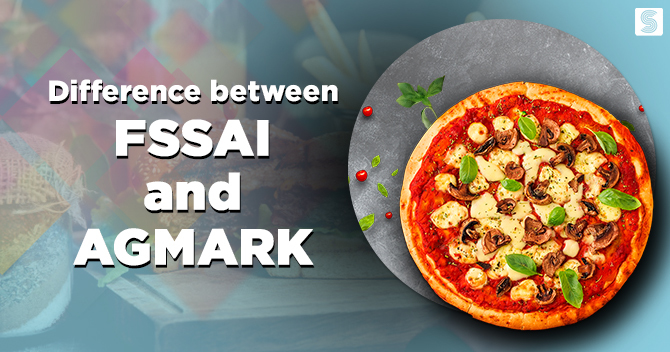Export of Food Products From India: A Complete Procedure
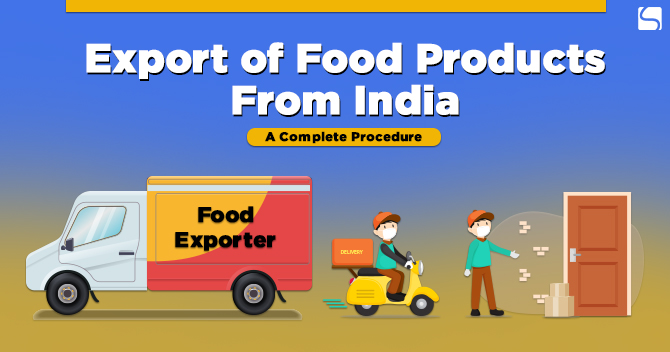
Shivani Jain | Updated: Oct 08, 2020 | Category: FSSAI
The term “Export of Food Products from India” denotes the criteria prescribed by FSSAI, under which an Exporter can send Food Items from India to any Foreign Country.
Further, the final authority regarding the Export of Food Products is with the Food Safety and Standards Authority of India. That means any good or item that is not as per the guidelines issued by FSSAI will not be allowed to cross the territorial limits of India.
In this blog, we will discuss the Export of Food Products from India.
Table of Contents
Concept of Export of Food Products From India
India, as a country, is known for its export of food items to other countries. The main reason behind the significant growth is the policies framed by our government.
Further, the food items have a direct connection with the health and safety of the consumers. As a result, several measures have been taken by the government of the countries around the world to ensure the safety and quality of the food items exported from India.
Moreover, the ultimate authority regarding the guidelines and directions for Export of Food Product is with FSSAI. That means an exporter needs to mandatorily comply with the guidelines issued by the FSSAI and provisions of the FSS Act 2006. Also, the exporter needs to apply for the FSSAI License with FSSAI.
Documents Required for the Export of Food Products
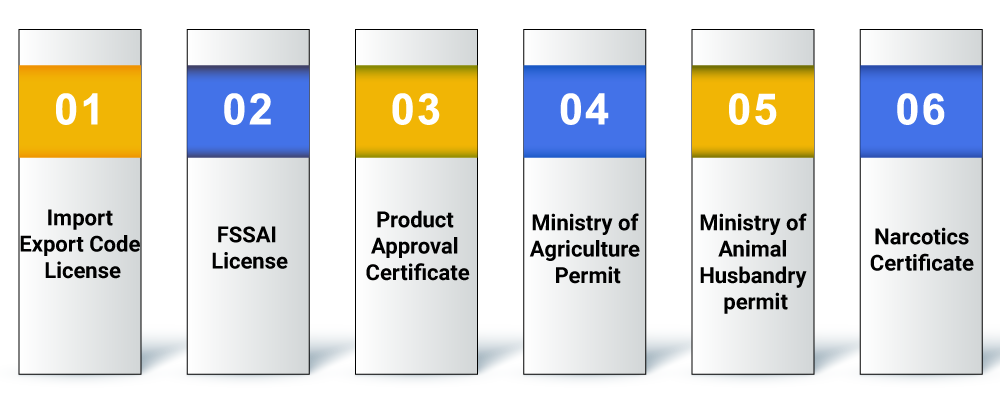
The documents required for the Export of Food Products from India are as follows:
- Import Export Code License;
- FSSAI License;
- Product Approval Certificate;
- Ministry of Agriculture Permit;
- Ministry of Animal Husbandry permit;
- Narcotics Certificate;
Labelling Requirements for the Export of Food Products
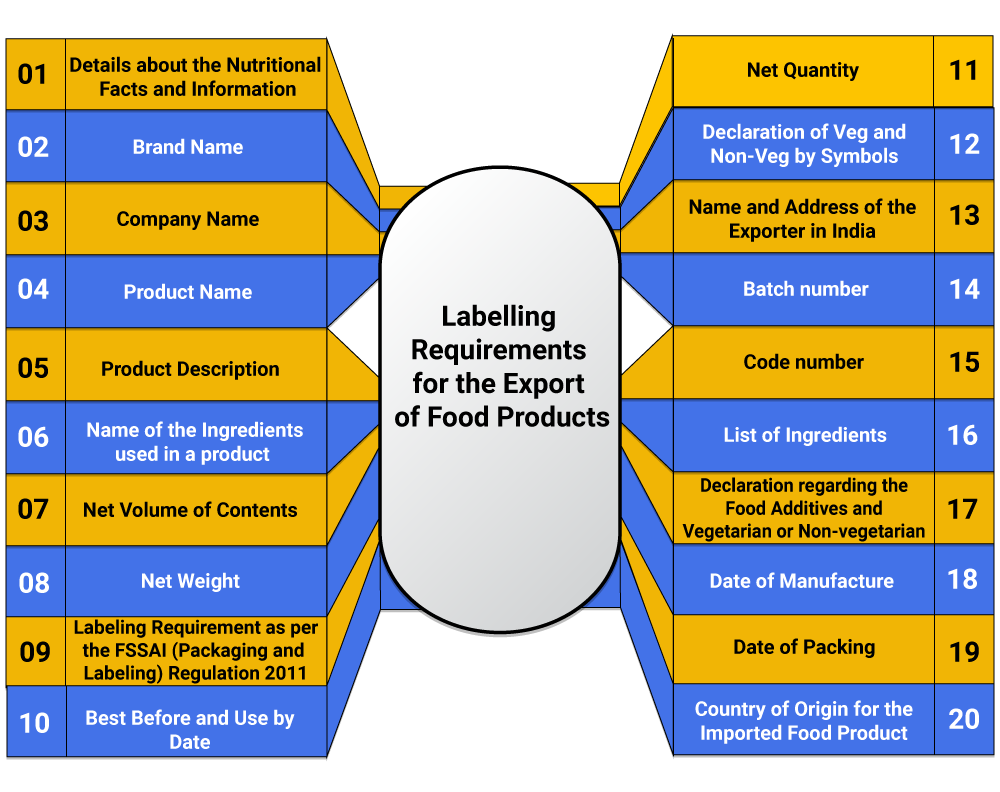
The label and content specifications needed for the Export of Food Products from India are as follows:
- Details about the Nutritional Facts and Information;
- Brand Name;
- Company Name;
- Product Name;
- Product Description;
- Name of the Ingredients used in a product;
- Net Volume of Contents;
- Net Weight;
- Labeling Requirement and Product Specification as per the FSSAI (Packaging and Labeling) Regulation 2011;
- Best Before and Use by Date;
- Net Quantity;
- Declaration of Veg and Non-Veg by Symbols;
- Name and Address of the Exporter in India;
- Batch number;
- Code number ;
- List of Ingredients;
- Declaration regarding the Food Additives and Vegetarian or Non-vegetarian;
- Date of Manufacture;
- Date of Packing
- Country of Origin for the Imported Food Product;
Further, these food labeling requirements need to be met by the company that is involved in exporting food outside India into the International Markets.
Significance of NOC in the Export of Food Products
An individual who wants to export food products from India needs to mandatorily obtain NOC (No Objection Certificate) from the authorities. Further, it is significant to mention that without an NOC, a person will not be allowed to undergo other formalities for the export of food items.
Also, the documents required to apply for an NOC are as follows:
- Country of Origin Certificate;
- Import Export Code (IEC) issued by the Director General of Foreign Trade;
- FSSAI Food Business License;
- Bill of Entry;
- End-use declaration;
- Other documents may be needed as well ( depending on individual import items);
Now, the exporter needs to apply for the No Objection Certificate and pay the lab charges for testing food product and samples.
Further, he/she requires to fulfil some of the requirements as follows to acquire NOC from the FSSAI Authorities:
- The food sample must be free from visible insects and fungal infestation;
- The food sample must have a healthy shelf life during clearance;
- Due Compliance with the FSS (Packaging and Labeling) Regulations 2011; and
- Product Specific Labeling Terms;
Once the exporter has satisfied all of the requirements, he/she will be issued an NOC. Also, the NOC issued will assist the applicant in obtaining the FSSAI license to export the food products outside the country.
Things to Remember for the FSSAI License for Exporters
The things to remember for the FSSAI License for Exporters are as follows:
- Central FSSAI License for the Exporters is granted by the Central Authority of FSSAI;
- The two types of FSSAI License for Exports are Manufacturers of the Food Products for Export and the Exporting Merchants and Traders, and a Food Business Operator can apply for any of them;
- Further, the applicants for the FSSAI Exporter License needs to declare whether he/she deals in exports only or operates in both the domestic and export market;
- Only the business units that are certified by the MOC (Ministry of Commerce) as 100% export units can apply for the FSSAI Exporter License;
- The exporter needs to acquire IEC (Import Export Code) from the DGFT (Director General of Foreign Trade);
- An FBO requires to apply for a separate “FSSAI Exporter License” for each premise;
- The FBO must ensure that all the premises must be mentioned on the IEC Certificate;
- An FBO can apply for FSSAI Central license for a period ranging from one to five years;
- After the expiry of the license, the exporter can file an application for FSSAI License Renewal. Further, the government fee for the Central FSSAI Central is Rs 17999 per year;
- An Exporter needs to submit both quarterly and annual return for his/ her Food Export business to the FSSAI Central authority;
- Every exporter must assure that the Food products which are being exported from India are both safe to consume and in compliance with the quality and labelling norms of the destination country;
Procedure to Obtain FSSAI License for Export of Food Products
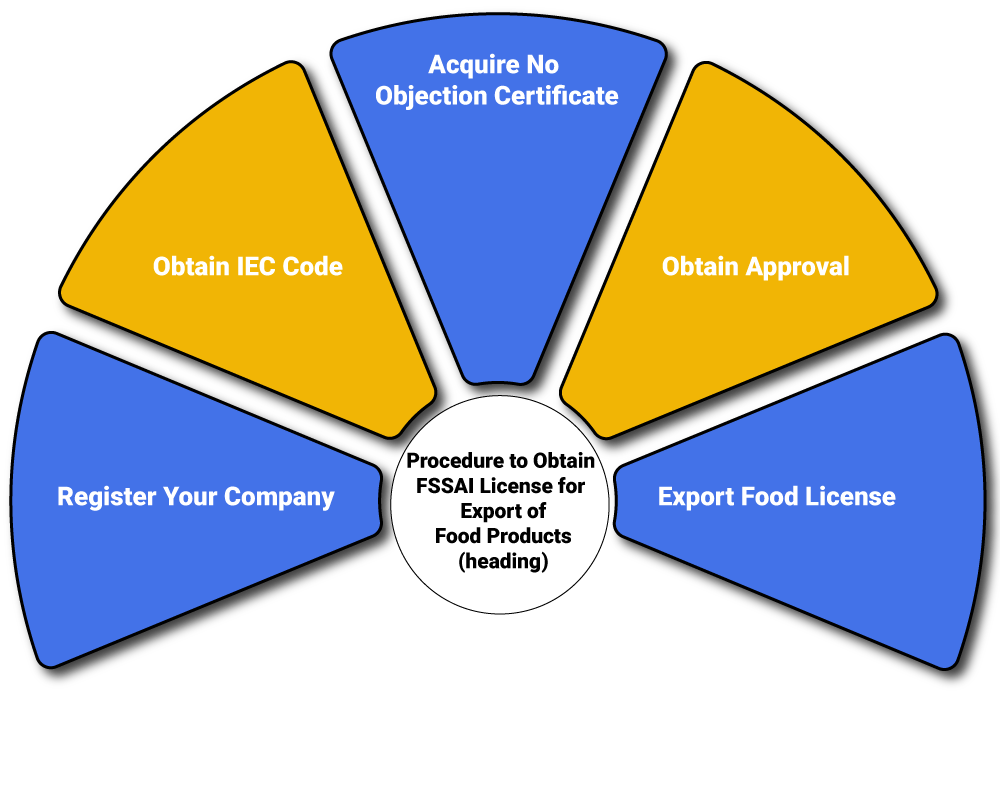
The steps involved in the procedure to obtain FSSAI License for the Export of Food Products from India are as follows:
Register Your Company
In the first step, the applicant needs to incorporate a company from either of the following business formats:
- Limited Liability Partnership;
- Private Limited Company; and
- Partnership;
Obtain IEC Code
Now, in the next step, the applicant requires to obtain an Import Export Code from the DGFT (Director General Foreign Trade) by visiting the official portal at DGFT.
Acquire No Objection Certificate
In the next step, the applicant exporter needs to acquire a No Objection Certificate regarding the food quality and compliance of regulations from FSSAI;
Obtain Approval
Now, the exporter requires to obtain approval from the authorities;
Export Food License
Lastly, the applicant exporter will be issued an FSSAI License by the Central Licensing Authority;
Conclusion
In a nutshell, the demand for Indian food products is not limited to the Indian territorial limits but has a consumer base all across the globe.
Further, to attract the global platform, every exporter needs to compulsorily acquire an FSSAI License. This license circulates a ray of hope all over the globe that the “manufacturing of goods” has taken place under clean and hygienic conditions.
Also, in order to acquire an FSSAI License for the export of food products from India, the applicant may consult Swarit Advisors experts in one go.
Also, Read: Import of Food Products in India.












